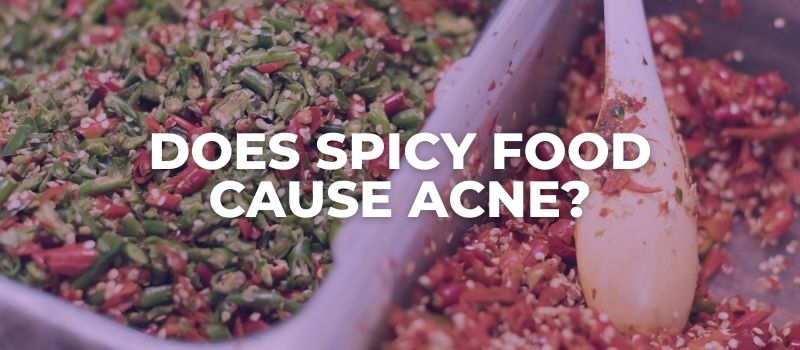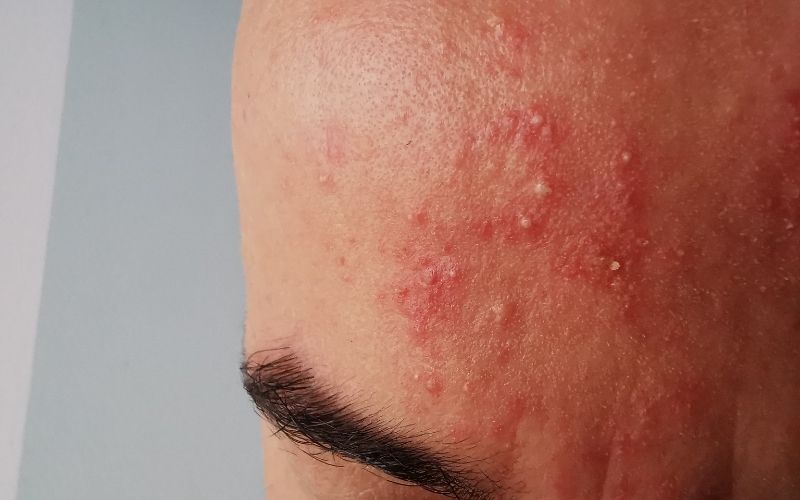The relationship between spicy food and acne is a controversial one, as professionals in the industry have long argued whether certain hot foods can exacerbate the inflammatory condition or even cause it in the first place.
Spicy food can cause acne flare-ups for some individuals due to the biological response known as vasodilation, a temporary enlargement of the capillaries that makes the skin appear redder and more inflamed and can be triggered by components such as capsaicin found in spicy foods.
However, despite several studies on whether spicy food causes acne, we still don’t have a definite answer.
Some people experience breakouts right after eating spicy foods, and others can eat all the spicy food in this world and have clear and healthy skin.
In this article, I will explain how spicy food can cause acne for some people and provide tips on how to manage acne through minor diet tweaks.
What Causes Acne?
Acne can be attributed to several key factors:
- Oil: Overproduction of sebum, an oily substance secreted by the skin’s oil glands, can clog pores. This can be due to hormonal imbalance, genetics, diet, or certain medications.
- Dead Skin Cells: Dead skin cells that should naturally shed can mix with the oil stuck inside the pores, contributing to the plug.
- Bacteria: Cutibacterium acnes, a strain of bacteria that lives on the skin finds its way inside the pores where it begins to feed on the plug and multiply.
- Inflammation: The body’s inflammatory response to the overgrowth of bacteria in the plug causes redness, swelling, and pus.
The Role of Diet in Acne
The connection between diet and acne has been a topic of scientific inquiry for decades.
While many agree that diet may not be the sole cause of this inflammatory condition, it can undoubtedly influence acne through various complex processes in the body.
Research indicates certain foods can exacerbate acne, particularly those high in refined carbohydrates and dairy products.
What Food Can Cause Acne?
Certain foods have been identified as potential acne triggers:
High glycemic index foods can spike blood sugar levels, leading to an increase in insulin release. This increase can result in a chain reaction that produces hormones known as androgens, which stimulate oil gland activity, overproduction of oil, and acne development.
Dairy products, especially skim milk and whey, have been linked to increased acne severity. This is believed to be due to the presence of hormones and bioactive molecules in milk, such as insulin-like growth factor 1 (IGF-1) and bovine IGF-binding protein 3 (IGFBP-3), which can increase sebum production and inflammation.
Saturated and trans fats, found in fried foods, processed snacks, and red meat, have been shown to promote inflammation in the body. This could potentially worsen acne, an inflammatory condition itself.
Chocolate has been debated, with some studies suggesting a link to acne and others finding no connection, but it may be the sugar, and not the chocolate itself, that leads to inflammation and acne development.
Can Spicy Food Cause Acne?

The direct relationship between spicy food and acne remains a contentious topic within dermatological research.
Some studies suggest that spicy foods might exacerbate acne for certain individuals, possibly due to the body’s response to capsaicin, the compound that gives chili peppers their heat.
However, these studies often note limitations, such as small sample sizes and reliance on self-reported data.
Conversely, other research finds no direct link between spicy food consumption and acne.
It’s important to consider that individual dietary reactions can vary greatly, making it difficult to establish a one-size-fits-all guideline.
For example, when testing whether a particular component or product can help reduce or exacerbate acne, researchers use something called the gold standard.
The gold standard trial works very well when testing a product, as it relies on changing one thing from a routine and expecting a result.
But how do you conduct a “gold-standard” trial with spicy food?
You would have to hold a clinical trial for years and submit a large group of people with acne to a strict diet that can potentially keep aggravating their issues.
It would be slow, expensive, and unethical, but it is mainly unrealistic and would likely yield unclear results, as food affects our bodies differently.
Studies done with spicy food, salty foods, sugary foods, high GI foods, etc., usually end up resulting in very minimal differences, often offering unclear results of whether or not said foods can cause or aggravate acne.
Additionally, food affects many body systems at once.
Unlike products, which are designed to work quickly and give a specific result, food is slow and cumulative.
It could be that spicy food wasn’t causing skin issues for someone, but it started doing so when they entered puberty, which is often connected with overactive hormones and excess sebum production.
This means that spicy food may or may not be the only factor causing skin concerns.
Additionally, spicy food is not necessarily an acne trigger for everyone, as there are people who eat spicy food and don’t experience acne, while there are also others who do and experience this inflammatory condition.
We are not all the same, and we should learn how to listen to our bodies so that we can nourish them better and achieve the physical state that we are most comfortable in.
Spicy food has been linked to acne before, but several studies, including a major one done on both spicy and salty food and involving 400 people, had an unclear result: ” There was no correlation detected between the foods and the severity of the condition.”
Again, this study, like many others, is flawed because it does not list how long the trial took, what the participants ate, and how exactly they were monitored.
But what does all this tell us?
This tells us that certain foods may very well be acne triggers for some people but not for others.
Ultimately, a balanced diet and a complete skincare routine tailored to your skin type and concerns are more important for clear and healthy skin than obsessively avoiding certain foods because they may be linked to acne.
How Spicy Food Might Affect Acne?
While the research is mixed and inconclusive, to say the least, here are several theories on how spicy food could potentially influence acne:
- Increase in Body Temperature: Spicy food can raise body temperature, potentially leading to sweating and blocked pores.
- Sweating and Skin Irritation: Sweating can irritate the skin, exacerbating existing acne or contributing to new breakouts.
- Possible Hormonal Effects: Some speculate that spicy food could influence hormonal balance, though the evidence remains inconclusive.
Tips for Managing Diet-Related Acne
If you suspect that your diet may be contributing to your acne, here are a few tips to help manage it:
Keep a Food Diary
Keeping a food diary can be beneficial in identifying foods that may be causing or exacerbating your acne.
To maintain a food diary, simply jot down everything you consume daily, including meals, snacks, beverages, and any supplements or medications, and note any acne flares.
Over time, patterns may emerge, empowering you to make informed decisions about your diet to help manage your acne more effectively.
However, beware of obsessively restricting foods without any evidence of a link to acne, as this can lead to unnecessary dietary restrictions and possibly nutrient deficiencies.
Gradually Reduce Trigger Foods
Once you’ve identified potential trigger foods through your diary entries, start by gradually reducing their frequency in your diet instead of eliminating them abruptly.
For example, if you’ve noticed that dairy products might exacerbate your acne, try replacing them with plant-based alternatives or completely eliminating dairy a few days a week and monitoring the changes.
It’s also beneficial to substitute high glycemic foods with low glycemic counterparts, such as replacing white bread with whole grain options.
This measured approach allows your body to adjust without shock, making it more sustainable in the long run.
Eat a Balanced Diet
While certain foods may exacerbate acne, it’s essential to maintain a well-balanced diet that includes a variety of nutrient-dense foods such as fruits, vegetables, whole grains, lean proteins, and healthy fats.
This ensures adequate intake of essential vitamins and minerals needed for overall skin health.
Moreover, incorporating anti-inflammatory foods such as fatty fish, nuts, seeds, and olive oil can help counter inflammation caused by acne-triggering foods.
Stay Hydrated
Drinking enough water is vital for maintaining clear skin and overall health.
Water not only promotes better kidney function, which aids in flushing out toxins, but it also helps improve lymphatic function, enabling the body to eliminate waste, including the accumulation of bacteria, viruses, and artificial hormones from foods and medicine we consume daily.
Lastly, water is vital for maintaining skin hydration, as it helps carry nutrients and oxygen to the skin cells, keeping them plump and less susceptible to inflammation.
Consult with a Dietitian
Professional guidance can tailor acne management strategies to your specific needs.
A registered dietitian can help identify trigger foods, recommend beneficial dietary changes, and ensure that any adjustments made are nutritionally sound and will not lead to nutrient deficiencies.
Frequently Asked Questions

How Long After Eating Spicy Food Could Acne Flare-Ups Occur?
Acne flare-ups in response to diet can take anywhere from a few days to a couple of weeks to appear, depending on individual skin cycles and digestive processes.
Are There Any Spicy Foods That Are Less Likely to Cause Acne?
The effect of spicy food on acne can vary widely among individuals.
Monitoring your body’s reaction to different spices may help identify less problematic options.
Can Eliminating Spicy Food Cure Acne?
While eliminating spicy food alone may not cure acne, it could potentially reduce flare-ups if your skin is sensitive to certain components in spicy foods.
Does Greasy Food Cause Acne?
While some individuals might notice their skin condition worsens after eating oily foods, this does not universally apply to everyone.
Scientific evidence directly connecting greasy food to acne is limited, indicating that diet alone doesn’t dictate acne development.
What Other Foods Cause Acne?
Typically, foods with a high glycemic index (GI) have been mostly linked to acne because they trigger insulin, which stimulates the sebaceous glands to produce excess amounts of pore-clogging oil.
Foods that contain high glycemic index (GI) are typically sugary foods such as:
- soft drinks
- sugary foods
- sweets
- sauces such as BBQ and ketchup
- salad dressings
Here’s a list of 60+ foods and their glycemic index that you can check out for more specific information.

My name is Simone and I am a certified skin specialist. I created this website to teach my readers how to take great care of their skin and I also like to occasionally share my honest opinions on skincare products I’ve tried. You can learn more about me here.
